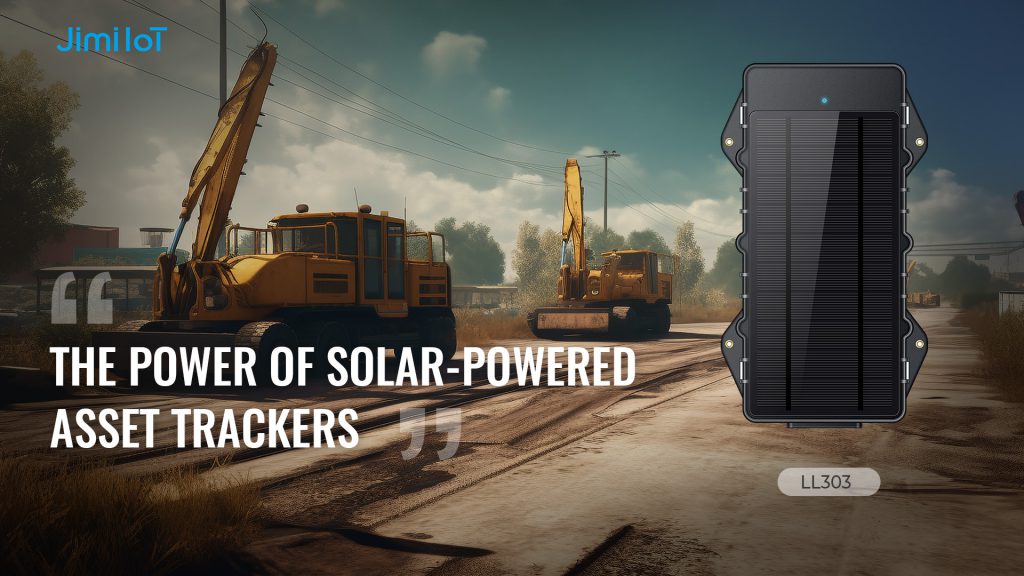Introduction
In the realm of modern logistics and management, the quest for more efficient and sustainable solutions is unending. One such innovation that has gained prominence is the utilization of solar-powered asset trackers. These devices are designed to tap into the sun’s energy, transforming it into a reliable source of power that drives asset-tracking operations.

Principles of Solar-Powered Asset Trackers
At the heart of solar-powered asset trackers lies the marvel of solar panels. These panels harness sunlight through photovoltaic cells, converting it into electricity through the photovoltaic effect. This direct conversion of sunlight into energy empowers asset trackers to function without solely relying on external power sources.
The integration of solar panels into asset trackers is a testament to innovation in sustainable technology. These trackers house these panels on their surfaces, capturing solar energy and transforming it into a reliable power source. This integration allows the trackers to operate autonomously, reducing the need for frequent battery replacements and minimizing maintenance costs.
Benefits
One of the most significant advantages of solar-powered asset trackers is their ability to reduce battery replacement frequency. By harnessing solar energy, these trackers extend the life of traditional batteries, leading to substantial cost savings over time. This reduction in battery usage also contributes to a more environmentally friendly solution, as it minimizes the generation of battery waste.
Another key benefit is their capacity for continuous operation. Solar-powered asset trackers can operate for extended periods outdoors without the need for frequent recharging or battery replacements. This reliability is especially crucial in applications such as logistics and long-distance transportation, where interruptions in tracking could result in costly delays.
Application Areas
Solar-powered asset trackers find applications in various sectors, enhancing efficiency and accuracy across the board. In the realm of logistics and freight, these trackers offer reliable tracking solutions for long-distance transportation, reducing maintenance-related interruptions and streamlining operations. On construction sites, solar-powered trackers help manage equipment, prevent theft, and optimize utilization. In agriculture and geospatial mapping, these trackers enhance precision and productivity, making them invaluable tools for optimizing land usage and yield.
Introducing the Jimiiot LL303 Solar GPS Tracker
One standout example of solar-powered asset tracking technology is the Jimiiot LL303 Solar GPS Tracker. This tracker combines solar energy harvesting with advanced GPS capabilities to provide accurate and reliable real-time tracking of assets. With its compact design and rugged build, the LL303 tracker is suitable for a wide range of applications, including fleet management, equipment tracking, and even wildlife monitoring.
Technical Challenges and Solutions
Despite their advantages, solar-powered asset trackers face challenges, particularly related to charging efficiency in different environmental conditions. Overcast days and low-light scenarios can impact the charging process, potentially limiting their effectiveness. However, advancements in solar technology are addressing these challenges, with innovative solutions that enhance charging efficiency and energy storage.
Energy storage solutions are crucial for ensuring the trackers have a consistent power supply even during periods of minimal sunlight. By implementing efficient energy storage systems, solar-powered trackers can store excess energy during sunny days, providing a backup power source for when sunlight is scarce.
Use Cases
Logistics and Freight: A logistics company adopted the Jimiiot LL303 Solar GPS Tracker for their long-haul truck fleet. The trackers’ ability to operate autonomously led to improved route optimization, reduced fuel consumption, and enhanced delivery efficiency.
Construction Site Management: A construction company integrated solar-powered trackers, including the LL303, to monitor the location and usage of heavy equipment. This led to a decrease in equipment theft, optimized equipment utilization, and streamlined maintenance schedules.
Agricultural Productivity: In agriculture, the LL303 tracker was used to monitor irrigation systems and machinery. The tracker provided real-time data on equipment status, allowing for prompt maintenance and increasing overall productivity.
Future Development Trends
As solar technology continues to advance, the future of solar-powered asset trackers holds great promise. Ongoing innovations in solar panel efficiency, energy storage solutions, and power management systems are expected to further enhance the reliability and functionality of these trackers. The integration of artificial intelligence and IoT technologies may also pave the way for smarter, more responsive solar-powered asset-tracking systems.
About Jimiiot
Solar-powered asset trackers, exemplified by the Jimiiot LL303 Solar GPS Tracker, represent a significant step forward in sustainable and efficient asset management. By harnessing the sun’s energy, these trackers reduce reliance on traditional power sources, decrease maintenance costs, and contribute to environmental conservation. With advancements in technology and the ability to address charging challenges, solar-powered asset trackers are poised to play a pivotal role in shaping the future of asset tracking and management.
JimiIoT is a global leader in innovative IoT solutions. We provide cutting-edge hardware and software tailored to enhance efficiency and connectivity. Our range of products includes advanced GPS tracking devices, asset management solutions, smart vehicle dashcams, and telematics platforms. With a focus on technological excellence and customer satisfaction, we empower businesses to optimize operations and gain valuable insights from data-driven analytics. Trust JimiIoT to drive positive change and unlock growth opportunities in the digital age.
If you would like more details, please visit Facebook, LinkedIn, INS, and Twitter pages to learn more.
 EN
EN ES
ES PT
PT TH
TH VN
VN JP
JP


